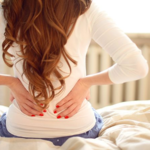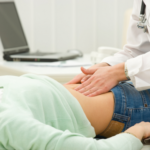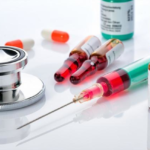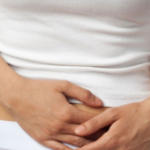How to relieve pain with inguinal hernia
Inguinal hernia occurs more often in men and newborns due to muscle weakness, impaired connective tissue development, and against the background of acquired factors. This is the most common surgical disease among children; in adults, a hernia in the groin occurs suddenly and may not disturb at all for some time.
A doctor is more often consulted when an inguinal hernia already hurts, all signs are growing, which may be an indication for emergency surgical removal. The disease can be cured only by surgery, but it requires preparation, so you need to know how to get rid of unpleasant symptoms without the risk of complications until the main treatment.
An inguinal hernia is not always painful. Some women and men are concerned only with a slight swelling in the groin and discomfort while walking. This is an uncomplicated disease, and it is important to preserve this stage until surgery.
For the purpose of pain relief, pills, injections, a bandage are used, nutrition is changed to eliminate constipation, and the load is reduced. In women, the disease often occurs without pain, while in men, vivid symptoms appear, so you have to resort to various methods to eliminate unpleasant sensations.
How does a hernia in the groin
The main manifestation of an inguinal hernia is swelling in the groin area, in men one or two testicles increase, in women the shape of the labia majora changes. The protrusion can be painless, which largely depends on the lifestyle, professional activity and general condition of the body. Athletes have a higher risk of complications with severe symptoms, while sedentary work is less dangerous, but always there.
Symptoms of a hernia may include the following:
- redness in the groin area without signs of inflammation;
- discomfort during movement;
- pain in the lower abdomen;
- dyspeptic symptoms, diarrhea, nausea and vomiting;
- burning sensation in the area of the protrusion.
An inguinal hernia is confirmed by ultrasound, but even during an examination without additional research, the doctor can diagnose the disease. Ultrasound diagnostics and other methods are needed to examine the contents of the hernial sac, assess the severity. Without ultrasound, it is impossible to perform an operation, the study is carried out before and after the removal of the defect.
Hernia pain
The main causes of pain with a hernia in the groin are infringement and associated bowel diseases. Complicated disease is manifested by general symptoms. In addition to pain, there is weakness, malaise, fever. Infringement can cause necrosis of internal organs, bleeding, blood poisoning and many other serious consequences.
Why does hernia pain occur:
- increased gas content in the intestines;
- high intra-abdominal pressure;
- sharp lifting of weight;
- frequent constipation, bloating;
- accidental injury;
- chronic cough.
In case of infringement, the following manifestations will disturb:
- pain in the groin and lower abdomen;
- the protrusion increases, thickens;
- there is nausea, rarely vomiting;
- the hernia does not retract into place and does not decrease in the supine position;
- retention of stool and urination.
Infringement may be accompanied by bleeding, then vomiting with blood appears. Without serious disturbances, the pain gradually subsides, but the general malaise remains. After a few hours from the moment of vivid symptoms, pallor of the skin, numbness is noted.
The subsidence of manifestations is not an improvement in the condition, but a new stage of the disease, the destruction of the intestinal wall begins due to insufficient blood circulation.
How to anesthetize
Hernia pain and the very fact of this disease are absolute indications for surgery. Sometimes a long preparation is required or there are contraindications for surgical treatment, then wearing a bandage and medication is prescribed to reduce pain.
Conservative methods are indicated for such contraindications to surgery:
- old age and severe systemic diseases;
- pregnancy;
- exhaustion of the body, cachexia.
The bandage will help relieve soreness after surgery. It is needed during sports, when there is a predisposition to a hernia or it has already been treated before.
Medications
Pain in the abdomen with a hernia is eliminated with antispasmodic drugs. For a while, No-Shpa or Drotaverin will help to anesthetize the area of the defect and the surrounding organs. But in no case should they be used regularly and with severe symptoms. Severe pain may indicate an infringement, and drugs will hide an important diagnostic sign. Untimely detection of complications ends with the most severe consequences for the whole organism.
From aching pain, local ointments and gels that can be applied directly to the protrusion area will help. When you are worried about indigestion, bloating and constipation, you can take a laxative, but only with the permission of a doctor.
The most important step to relieve soreness and improve overall well-being will be a diet:
- fatty foods, spicy and too sweet are excluded;
- carbonated drinks, coffee are removed from the diet;
- it is not recommended to rush while eating;
- it is important to eat often, but in small portions;
- it is better to steam or bake;
- calorie content decreases, more vitamin food is added.
Folk remedies
Traditional medicine recipes can be combined with a course prescribed by a doctor, but they cannot be treated as an independent method of treatment. At home, you can prepare compresses, decoctions, tinctures and ointments for external use, as well as restorative agents for oral administration. It is important to remember that most medicinal herbs are allergens, so their choice must be taken responsibly.
What to do at home to get rid of the pain of an inguinal hernia:
- a fern compress is not only a good pain reliever, but also a way to fix the protrusion at night, for which you need to attach a leaf of the plant to the hernia;
- nettle and sour cream compress - you need to chop the nettle, add sour cream, apply the finished mixture to the defect overnight, fixing it with a cabbage leaf;
- gooseberry decoction is a general tonic medicine, you can drink half a glass of it daily before meals;
- decoction of clover - taken daily for 1/3 cup half an hour before meals.
A popular remedy for inguinal hernia is pork fat.
From it you can independently prepare a healing ointment. To do this, the fat is melted and poured into a glass container, where a whole chicken egg is lowered. Vinegar is poured into the jar, it is left in a cool room until the egg is completely dissolved. Then the mixture is melted again, mixed and left in the refrigerator. The finished ointment can be applied to a sore spot and fixed with a bandage for several hours daily.
A sauerkraut compress will also help with soreness. To do this, you need to make a compress and apply to the hernia. For this purpose, other ingredients are also suitable: wormwood, cornflower flowers.
Operation
Removal of a hernia must be carried out because of the risk of complications:
- irreducibility - adhesions are formed between the organ and the hernial sac, which is why the contents cease to move freely, with such a complication, a planned operation is performed;
- coprostasis - when a part of the intestine is in the hernial sac, stool masses accumulate in it, which later ends with intestinal obstruction;
- infringement - a dangerous condition with an indication for emergency surgery, the contents of the hernial sac are compressed, this affects the clamped organs, vessels and surrounding tissues, there is a risk of internal bleeding and necrosis;
- inflammation - the condition requires immediate surgery with careful preparation.
Removal is carried out by open and laparoscopic surgery. In the first case, a wide incision is made in the abdominal wall in the area of the defect. The hernia is reduced into place and the tissues are sutured with mesh or natural tissue tension. Laparoscopy is less traumatic, 3 punctures are made through which instruments and a camera are inserted.
Pain relief can be done with a local anesthetic or the operation can be done under general anesthesia. The method of anesthesia is selected, depending on the stage of the disease and the choice of the patient himself, if there are no contraindications.
Local anesthesia is used at the initial stage of a hernia, and when there are contraindications to general anesthesia. Spinal anesthesia provides complete insensitivity below the injection site, while the patient is conscious. General anesthesia is indicated for laparoscopic surgery, with large defects and complicated hernia.
In children
In children, a hernia is no less rare, and the treatment is performed surgically. The earlier the operation is performed, the lower the risk of severe complications, including infertility. In a child, a hernia can hurt, as indicated by strong crying, poor sleep, and anxiety.
Treatment of children at home is strictly prohibited, because at any time infringement can occur, which without timely assistance will lead to the death of organs in the hernial sac in a few hours.
Crying and crying of the child only contribute to the rapid infringement of the hernia. Outwardly, the complication will be manifested by an increase in swelling, severe redness of the skin. In this case, you need to call an ambulance. Before a planned operation, when there are no complications, a bandage is prescribed for the child, which will support the organs, preventing them from protruding even more.
It is possible to save a child from the pain of an inguinal hernia only by the decision to perform an operation. There are no other ways that could return the organs to their place, ensuring normal development without the risk of re-disease.
Preparation
Elective surgery requires special preparation, which begins 2-3 weeks in advance:
- a week before the operation, general blood and urine tests are taken, ultrasound is performed, fluorography and consultation with specialized doctors are additionally prescribed;
- the type of anesthesia is discussed with the surgeon, contraindications to the chosen anesthesia option are excluded;
- in a few days, you need to start following a strict diet, remove gas-producing foods from the diet;
- before the operation, dinner should be light, a cleansing enema is indicated in the morning;
- the operation is not performed until the risk factors in the form of acute diseases and exacerbation of chronic ailments are eliminated.
Recovery after treatment
After hernia repair, the pain will disturb for several days, which is a normal reaction to tissue injury. The doctor will prescribe painkillers, vitamins and give recommendations about nutrition and wound care.
In the early period after surgery, bed rest, sparing nutrition and wearing a postoperative bandage will help reduce pain.
The first 3 weeks after hernia repair, it is recommended to refrain from sexual activity. Lifting weights is completely excluded, as well as active sports. You can start doing exercises from the second month after the operation, gradually returning to your usual life.
Causes and risk factors for inguinal hernia
You can prevent a hernia by knowing its main factors and causes of occurrence:
- heredity and age - these factors cannot be controlled, but more attention can be paid to prevention when there is a predisposition to a hernia;
- excess weight and pregnancy - associated with an increase in intra-abdominal pressure, when there is muscle weakness, this can provoke protrusion of organs;
- congenital anomalies of the inguinal canal;
- incomplete occlusion of the vaginal process;
- heavy sports;
- high workload;
- constipation, diseases of the genitourinary system;
- chronic cough - due to pulmonary tuberculosis or bronchitis.
Inguinal hernia is of different types. A severe form is considered inguinal-scrotal, it occurs in men as a complication. It can be unilateral and bilateral, which is manifested by an increase in the scrotum on one or both sides. This form of the disease is common among young boys. But both in adults and in children, treatment is possible only surgically.
Many clinics offer conservative methods for inguinal hernia, but seriously ill patients need this approach when surgery is strictly contraindicated. It is also a temporary measure before surgery and a way of post-surgery recovery.










